英语禁忌语及其语用功能
浅析英语禁忌语的使用
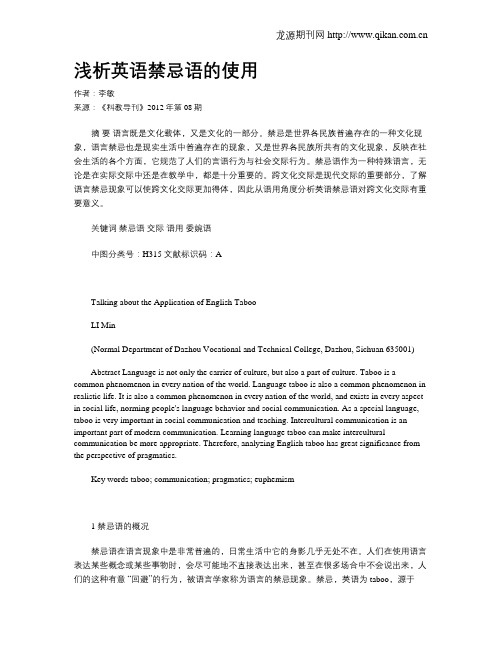
浅析英语禁忌语的使用作者:李敏来源:《科教导刊》2012年第08期摘要语言既是文化载体,又是文化的一部分。
禁忌是世界各民族普遍存在的一种文化现象,语言禁忌也是现实生活中普遍存在的现象,又是世界各民族所共有的文化现象,反映在社会生活的各个方面,它规范了人们的言语行为与社会交际行为。
禁忌语作为一种特殊语言,无论是在实际交际中还是在教学中,都是十分重要的。
跨文化交际是现代交际的重要部分,了解语言禁忌现象可以使跨文化交际更加得体,因此从语用角度分析英语禁忌语对跨文化交际有重要意义。
关键词禁忌语交际语用委婉语中图分类号:H315 文献标识码:ATalking about the Application of English TabooLI Min(Normal Department of Dazhou Vocational and Technical College, Dazhou, Sichuan 635001)Abstract Language is not only the carrier of culture, but also a part of culture. Taboo is a common phenomenon in every nation of the world. Language taboo is also a common phenomenon in realistic life. It is also a common phenomenon in every nation of the world, and exists in every aspect in social life, norming people's language behavior and social communication. As a special language, taboo is very important in social communication and teaching. Intercultural communication is an important part of modern communication. Learning language taboo can make intercultural communication be more appropriate. Therefore, analyzing English taboo has great significance from the perspective of pragmatics.Key words taboo; communication; pragmatics; euphemism1 禁忌语的概况禁忌语在语言现象中是非常普遍的,日常生活中它的身影几乎无处不在。
语用学角度下英汉交际中的禁忌语
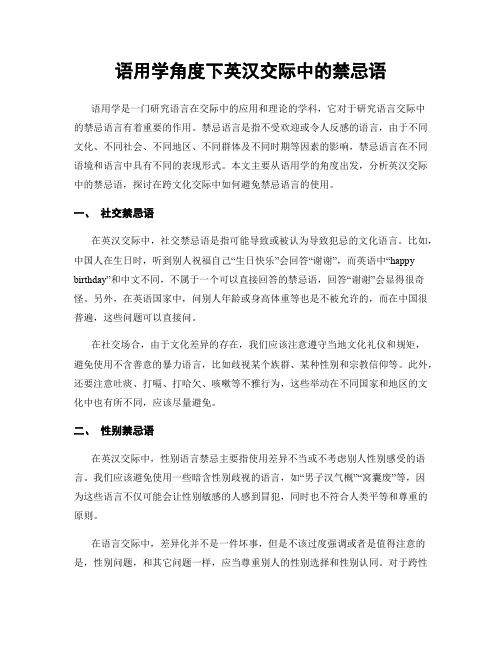
语用学角度下英汉交际中的禁忌语语用学是一门研究语言在交际中的应用和理论的学科,它对于研究语言交际中的禁忌语言有着重要的作用。
禁忌语言是指不受欢迎或令人反感的语言,由于不同文化、不同社会、不同地区、不同群体及不同时期等因素的影响,禁忌语言在不同语境和语言中具有不同的表现形式。
本文主要从语用学的角度出发,分析英汉交际中的禁忌语,探讨在跨文化交际中如何避免禁忌语言的使用。
一、社交禁忌语在英汉交际中,社交禁忌语是指可能导致或被认为导致犯忌的文化语言。
比如,中国人在生日时,听到别人祝福自己“生日快乐”会回答“谢谢”,而英语中“happy birthday”和中文不同,不属于一个可以直接回答的禁忌语,回答“谢谢”会显得很奇怪。
另外,在英语国家中,问别人年龄或身高体重等也是不被允许的,而在中国很普遍,这些问题可以直接问。
在社交场合,由于文化差异的存在,我们应该注意遵守当地文化礼仪和规矩,避免使用不含善意的暴力语言,比如歧视某个族群、某种性别和宗教信仰等。
此外,还要注意吐痰、打嗝、打哈欠、咳嗽等不雅行为,这些举动在不同国家和地区的文化中也有所不同,应该尽量避免。
二、性别禁忌语在英汉交际中,性别语言禁忌主要指使用差异不当或不考虑别人性别感受的语言。
我们应该避免使用一些暗含性别歧视的语言,如“男子汉气概”“窝囊废”等,因为这些语言不仅可能会让性别敏感的人感到冒犯,同时也不符合人类平等和尊重的原则。
在语言交际中,差异化并不是一件坏事,但是不该过度强调或者是值得注意的是,性别问题,和其它问题一样,应当尊重别人的性别选择和性别认同。
对于跨性别等特殊群体,在日常交往中要注意使用正确的称呼及用语,尊重其自我认同和平等权利。
三、宗教禁忌语在英汉交际中,宗教禁忌语的使用要特别注意,因为宗教是一个十分敏感的话题,底线、界限和约束都较为明确。
我们要注意避免在交际中涉及到诸如某个国家的宗教血统、教派争端、圣约、教义、神话、神明等方面的话题或用语。
英语禁忌语大全
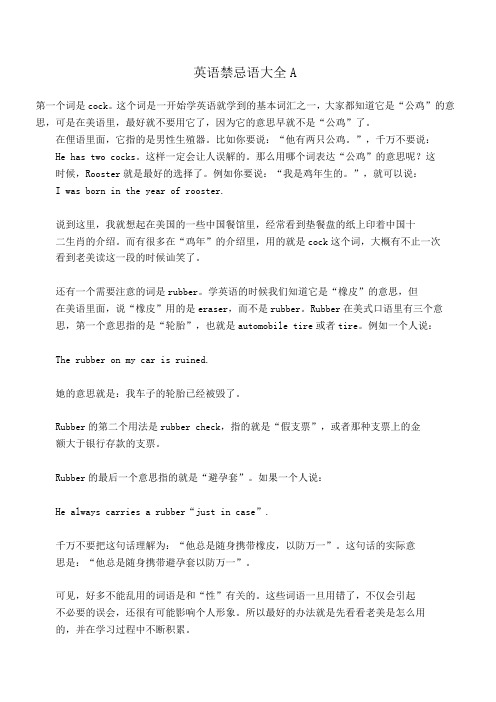
英语禁忌语大全A第一个词是cock。
这个词是一开始学英语就学到的基本词汇之一,大家都知道它是“公鸡”的意思,可是在美语里,最好就不要用它了,因为它的意思早就不是“公鸡”了。
在俚语里面,它指的是男性生殖器。
比如你要说:“他有两只公鸡。
”,千万不要说:He has two cocks。
这样一定会让人误解的。
那么用哪个词表达“公鸡”的意思呢?这时候,Rooster就是最好的选择了。
例如你要说:“我是鸡年生的。
”,就可以说:I was born in the year of rooster.说到这里,我就想起在美国的一些中国餐馆里,经常看到垫餐盘的纸上印着中国十二生肖的介绍。
而有很多在“鸡年”的介绍里,用的就是cock这个词,大概有不止一次看到老美读这一段的时候讪笑了。
还有一个需要注意的词是rubber。
学英语的时候我们知道它是“橡皮”的意思,但在美语里面,说“橡皮”用的是eraser,而不是rubber。
Rubber在美式口语里有三个意思,第一个意思指的是“轮胎”,也就是automobile tire或者tire。
例如一个人说:The rubber on my car is ruined.她的意思就是:我车子的轮胎已经被毁了。
Rubber的第二个用法是rubber check,指的就是“假支票”,或者那种支票上的金额大于银行存款的支票。
Rubber的最后一个意思指的就是“避孕套”。
如果一个人说:He always carries a rubber“just in case”.千万不要把这句话理解为:“他总是随身携带橡皮,以防万一”。
这句话的实际意思是:“他总是随身携带避孕套以防万一”。
可见,好多不能乱用的词语是和“性”有关的。
这些词语一旦用错了,不仅会引起不必要的误会,还很有可能影响个人形象。
所以最好的办法就是先看看老美是怎么用的,并在学习过程中不断积累。
第一章什么是不能说出口的英语:禁忌语与俚语a.禁忌语与俚语本书介绍的语言,在英语是属于淫秽的语言(obscene language),也可以说是脏话(dirty words)。
汉英禁忌语

汉英禁忌语一、禁忌语和委婉语语言禁忌 (Language Taboo),语言禁忌源于人类最初对自然现象和自然力的困惑和误解。
早在远古时代,人们因对日月交替风雨雷电、火山地震以及人和物的生老病死等自然现象和自然规律不理解,故幻想创造了神,认为神是万物的主宰、祸福的根源。
因此,神灵不可亵渎,与神灵有关的东西都应被尊为灵物,被列为禁忌,不可冒犯。
英语中,God(上帝)、Satan(魔王撒旦)等均有婉称,汉语中有国讳、圣讳、官讳或家讳。
疾病与死亡为人之大忌,无论是东方人,还是西方人,都十分忌讳疾病与死亡,所以在交际时都尽量回避这些字眼,以婉言称之。
禁忌语(taboo)是人们多数情况下不能说或不想说的话。
禁忌语多是与身体某些器官及功能或与宗教,崇拜有关,包括脏话(obscene)、粗俗语(vulgar)、和仵犯神灵的话(profane)。
禁忌语可以不用,可话不能不说,意思不可不表达,因而出现了大量的委婉语来代替禁忌语。
二、英语中委婉语英语中委婉语(euphemism)一词源自希腊语。
前缀“eu”的意思是“good”(好),词根“-phemism”意为“speech”(言语),合起来意思是“word of good omen”(吉言或好听的说法)。
委婉语是人类语言中普遍存在的一种语言现象,广泛应用于社会生活的各个方面。
由于语言交际是人类赖以维系社会关系和人际关系的重要手段,因此人们在交际中通常避免使用引起双方不快从而损害双方关系的语言,而采取迂回曲折的语言来表达思想、交流信息。
因此,委婉语自产生之日起,就担负着“润滑”交际的重任。
“如果没有委婉语,世界的运转会因摩擦而停止,人间将充满仇怨”。
正如美国学者Hugh Rawson 所描述的那样,委婉语“如此深深地嵌入我们的语言,以至我们中间没有谁——即便是那些自诩言谈直截了当的人——能够在不使用委婉语的情况下过完一天的”。
(一)有关“死亡”的委婉语人们生活中最忌讳的就是死亡,因此语言禁忌中关于死亡的委婉语大量存在。
中西文化对比与应用之禁忌语
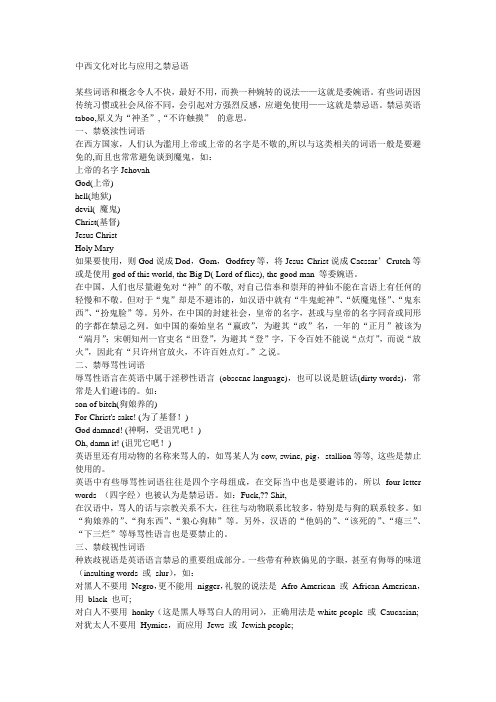
中西文化对比与应用之禁忌语某些词语和概念令人不快,最好不用,而换一种婉转的说法——这就是委婉语。
有些词语因传统习惯或社会风俗不同,会引起对方强烈反感,应避免使用——这就是禁忌语。
禁忌英语taboo,原义为“神圣”,“不许触摸”的意思。
一、禁亵渎性词语在西方国家,人们认为滥用上帝或上帝的名字是不敬的,所以与这类相关的词语一般是要避免的,而且也常常避免谈到魔鬼,如:上帝的名字JehovahGod(上帝)hell(地狱)devil( 魔鬼)Christ(基督)Jesus ChristHoly Mary如果要使用,则God说成Dod,Gom,Godfrey等,将Jesus Christ说成Caessar’Crutch等或是使用god of this world, the Big D( Lord of flies), the good man 等委婉语。
在中国,人们也尽量避免对“神”的不敬, 对自己信奉和崇拜的神仙不能在言语上有任何的轻慢和不敬。
但对于“鬼”却是不避讳的,如汉语中就有“牛鬼蛇神”、“妖魔鬼怪”、“鬼东西”、“扮鬼脸”等。
另外,在中国的封建社会,皇帝的名字,甚或与皇帝的名字同音或同形的字都在禁忌之列。
如中国的秦始皇名“嬴政”,为避其“政”名,一年的“正月”被该为“端月”;宋朝知州一官吏名“田登”,为避其“登”字,下令百姓不能说“点灯”,而说“放火”,因此有“只许州官放火,不许百姓点灯。
”之说。
二、禁辱骂性词语辱骂性语言在英语中属于淫秽性语言(obscene language),也可以说是脏话(dirty words),常常是人们避讳的。
如:son of bitch(狗娘养的)For Christ's sake! (为了基督!)God damned! (神啊,受诅咒吧!)Oh, damn it! (诅咒它吧!)英语里还有用动物的名称来骂人的,如骂某人为cow, swine, pig,stallion等等, 这些是禁止使用的。
在跨文化交际中的英语语言禁忌语及运用

在跨文化交际中的英语语言禁忌语及运用作者:殷华来源:《速读·中旬》2014年第10期一、前言在全球快速国际化的过程中,跨文化交际和沟通,不论是在人们的日常交际还是学校教学、商务往来中都日趋重要。
在不同文化或多元文化背景下进行跨文化交际时,当人们想表达或传递信息和表达想法时,就会涉及语言的使用,也会涉及禁忌语的应用。
语言是文化的载体,其本身的表达和交流也是文化的一部分。
语言禁忌不仅是一种语言现象,而且是一种文化现象,存在于不同的民族、区域和国家,也体现在不同文化背景下的生活、社交、商务、沟通等不同领域。
不同的文化背景和不同的地理环境下,语言禁忌是大不同的。
它是语言文化的一种体现,也是社会普遍存的一种文化现象。
禁忌语作为语言中的一种特殊语言,不管是在社会的普遍交际中,还是在教育体系的教学中,都非常重要且不可或缺。
语言禁忌在跨文化交际中逐渐变得重要和必要,成为跨文化交际的重要组成部分。
语言禁忌是语言现象中的一部分,也是普遍存在的。
所谓跨文化沟通,涉及语言和文化两个层面,二者有着既相互独立又密不可分的关系。
不同的民族,不同的区域,不同的国家,都有其独特的文化,从历史和语言文化发展角度看,文化会作用于语言的发展,影响语言的表达和准确含义的传递。
因此,看待语言禁忌也要考虑到多元文化的影响和作用,下面结合不同民族与国家的独特文化,分析和解读语言的禁忌现象。
二、禁忌语的语用原则和特点我们简单了解禁忌语的语用原则和特点,所谓语用原则,即语言会受到一些因素的制约,包括特定的某种社会条件、社会环境。
从语言的表达一方和受众一方进行研究,在某一特定的社会环境中,有其独有的特定语言,即语用原则的建立。
英语禁忌语的语用原则基本上分为以下四点:(一)禁用亵渎性词语在研究禁忌语的语用原则时,不同的文化背景下,有其独特的原则与特点。
例如,在西方社会中,宗教是一个很重要和具有文化特点的领域,其中涉及很多禁忌语。
在基督教中,“上帝”是个非常重要的语言词汇,具有特殊的文化渊源。
你知道英语中哪些禁忌语是不能说的吗

你知道英语中哪些禁忌语是不能说的吗你知道英语中哪些禁忌语是不能说的吗学习语言中我们除了学习它的好,也要懂得它的相关忌语,你知道英语中哪些禁忌语是不能说的吗?盼望可以帮到大家1. 禁忌语a. 禁忌语与俚语在英语是属于的语言(obscene language),也可以说是脏话(dirty words)。
往往是不便说出口的话,因而能说是隐语(shadow language),也可以说是“成为禁忌的语言”(tabooed words)。
其中,尤其不便说出口的话有fxxx,由于刚好是四个字母,所以禁忌语也可以说成four-letter word(四字经)。
此外,shit(大便)是四字,cock(阴茎) 也是四字,所以four-letter word有“不便开口的话”之意。
所谓禁忌语并不是现代才有,受迷信或传统支配的古代或原始民族更多,这是在某种环境或状况下,不便说出口的话。
这也不限于的话,也有正相反的情形。
例如在缅甸或朝鲜、大溪地等国家,国王或皇帝的名字是至高无上,不行以任凭说出口的,日本到今日还是如此,外国的报纸会不客气地说Emperor Hirohito ( 裕仁天皇)或Prince Akihito(明仁皇太子),但在日本的报纸上却不能写出名字。
并不限于未开发的国家才有禁忌语,例如英国对有关宗教的语言- God( 神) 、devil(魔鬼)、Christ(耶稣)等-是除了仔细谈话时以外,不行以任凭说出口的。
如在开玩笑或轻松的谈话时说:Jesus Christ (耶稣基督)肯定会被认为你是不懂礼貌的人。
在骂“你是个畜生!”或“可恶的东西!”时,英国人会使用有关神的话。
For Christs sake! (为了基督!)God damned! (神啊,受诅咒吧!) Hell! (可恶的地狱!) Oh, damn it! (诅咒它吧!)这些话比我们骂“你这畜生!”更为严峻,由于这不仅是“骂人”,也是对神的冒犯。
英汉语言交流中的禁忌语及委婉表达
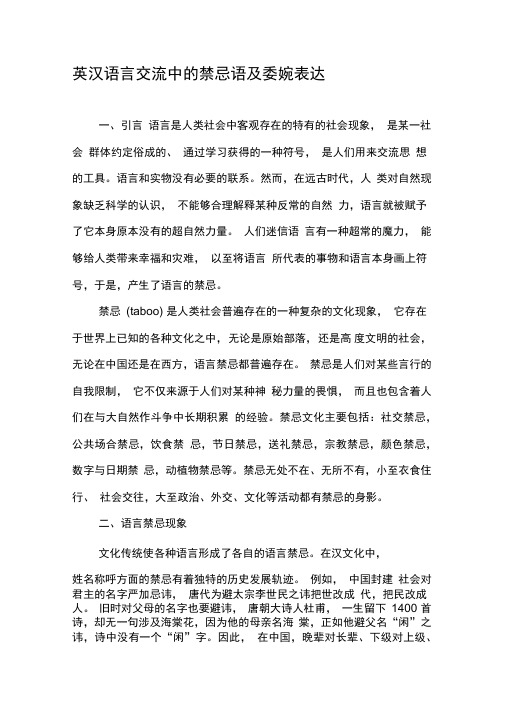
英汉语言交流中的禁忌语及委婉表达一、引言语言是人类社会中客观存在的特有的社会现象,是某一社会群体约定俗成的、通过学习获得的一种符号,是人们用来交流思想的工具。
语言和实物没有必要的联系。
然而,在远古时代,人类对自然现象缺乏科学的认识,不能够合理解释某种反常的自然力,语言就被赋予了它本身原本没有的超自然力量。
人们迷信语言有一种超常的魔力,能够给人类带来幸福和灾难,以至将语言所代表的事物和语言本身画上符号,于是,产生了语言的禁忌。
禁忌(taboo) 是人类社会普遍存在的一种复杂的文化现象,它存在于世界上已知的各种文化之中,无论是原始部落,还是高度文明的社会,无论在中国还是在西方,语言禁忌都普遍存在。
禁忌是人们对某些言行的自我限制,它不仅来源于人们对某种神秘力量的畏惧,而且也包含着人们在与大自然作斗争中长期积累的经验。
禁忌文化主要包括:社交禁忌,公共场合禁忌,饮食禁忌,节日禁忌,送礼禁忌,宗教禁忌,颜色禁忌,数字与日期禁忌,动植物禁忌等。
禁忌无处不在、无所不有,小至衣食住行、社会交往,大至政治、外交、文化等活动都有禁忌的身影。
二、语言禁忌现象文化传统使各种语言形成了各自的语言禁忌。
在汉文化中,姓名称呼方面的禁忌有着独特的历史发展轨迹。
例如,中国封建社会对君主的名字严加忌讳,唐代为避太宗李世民之讳把世改成代,把民改成人。
旧时对父母的名字也要避讳,唐朝大诗人杜甫,一生留下1400 首诗,却无一句涉及海棠花,因为他的母亲名海棠,正如他避父名“闲”之讳,诗中没有一个“闲”字。
因此,在中国,晚辈对长辈、下级对上级、学生对老师,决不能直呼其名,否则,会被视为唐突无礼、缺乏教养、大逆不道。
而在西方,除了某些特定工作头衔,如:教授、医生、博士、法官等外,一般是直呼其名,这反倒让人觉得亲切、友好和自然,就连父母与子女之间也是如此。
个人隐私在西方国家里也是人们最大的忌讳。
因此,在与西方人交流中,打听、询问关于个人的年龄,财产、收入、恋爱婚姻、宗教信仰、政治倾向等一些私事,即是用另一种方式侵犯了别人的隐私权。
- 1、下载文档前请自行甄别文档内容的完整性,平台不提供额外的编辑、内容补充、找答案等附加服务。
- 2、"仅部分预览"的文档,不可在线预览部分如存在完整性等问题,可反馈申请退款(可完整预览的文档不适用该条件!)。
- 3、如文档侵犯您的权益,请联系客服反馈,我们会尽快为您处理(人工客服工作时间:9:00-18:30)。
English Taboo Words and Its PragmaticFunctionsAbstract:Different countries have different taboos. Furthermore, linguistic taboos change with the development of society. With the increasing importance of communication between English and Chinese, English taboo words usually become block for English learners.Therefore, learning English taboos and their pragmatic functions is quite essential. The paper firstly tries to make an analysis of what linguistic taboo is on the basis of some research study and its significance. Secondly, it introduces several important classifications of English taboo. The paper points out that different taboos have different pragmatic functions and the ways of avoiding taboo.Key Words: English taboo words; evolution; pragmatic functions; formsⅠ. IntroductionIn language communication, for some reasons, certain words are avoided to be used by people. They consider them sacred, dangerous, unpleasant or offensive. These words are to be forbidden in many situations, particularly in modern civilization, but only allowed and used by certain people in some specific circumstances. This phenomenon is what we call linguistic taboo.Taboo phenomenon has been widely found in all cultures in the word. When this phenomenon is extended to language, linguistic taboo comes into being. Language and culture are closely related, and the differences between cultures have a tremendous impact on the features of language. Therefore we can conclude there is vast difference in English and Chinese taboo.However, not everyone knows their specific difference which causes easily to make mistakes and embarrassment in cultural exchange. For example, in China, we usually ask people how old they are. On the contrary, in England, it is extremely not polite to ask their age, which is regarded as an exceedingly private question. What‟s more, some words may lead to relevant psychological behavior of using those reverent or unpleasant words. These words perhaps result in uneasiness, dread or sadness, so people try to avoid using these displeased words directly. These annoying words gradually belong to linguistic taboo. Then euphemism which is thought to be less offensive or unpleasant than anotherword and expresses these meanings naturally emerged. For instance, English people hardly use the word “die”, instead, they may use “pass away or go to heaven” to express the same meaning. This phenomenon actually exists widely in England, but few English learners know it and may ignore it. A lack of knowledge in this field or improper use of linguistic taboos may trigger misunderstandings, conflicts and other unknown serious consequences in the cross-cultural communications which is becoming increasingly frequent and wider now. Hence, it becomes a great of importance for us to know English taboo and its pragmatic functions. The correct way to avoid taboo is to know what English taboo words are, try to avoid them and use relevant euphemisms for the purpose of successful cultural exchange.Recently, there have been some books and assays on research of English taboo which comes from a number of aspects. For example, in An Analysis of the Social Functions of Taboo Words(Cui Ai yong,2006:4), it focuses on the analysis of English linguistic taboo, its translation, its trend of development, its social functions or its usage in English movies. Other research is about the discussion of the differences and similarities of English and Chinese taboo or cultural connation of English taboo. According to these aspects, my essay mainly focuses on detailed introduction of English taboo, namely, its definition, resource, significance, classification and its pragmatic functions. In my opinion, knowing English taboo and how to use it in correct and suitable way is essential to us English learners for good cultural communication.1.1The definition of English tabooAmerican linguistic Victoria Fromkin considers that taboo is actually the word which is forbiddened to be used or at least should not be used in this elegant society. In Oxford Advanced Learner‟s English-Chinese Dictionary, taboo can be defined that it is this word likely to be considered offensive, shocking or indecent by certain people and to be thought not necessarily by everyone. On the basis of these definitions, my conclusion is that the taboo word is a type of language people in some situations, out of politeness or avoiding spurring strong dislike but could not or wouldnot literally use.1.2The evolution of linguistic tabooThe word “taboo”was borrowed from Tonga, a Polynesian language, with the meaning of something forbidden or banned. Its first recorded use in English was by Captain James Cook (1729-1779), a British navigator .In the 18 century, he came to Tonga for adventure in the southern part of the Pacific Ocean. He discovered many odd customs and taboo phenomena there. For example, some certain things could only be used by God, King or monks, the type of special people rather than ordinary people. Some names and words were absolutely forbiddened. People who went to taboo place or touch taboo object would suffer sever injury. Offenders must be punished by supernatural power. People on this island all called this phenomenon “tabu”.Then James Cook brought back the word “tabu” to Britain, which later became the English word “taboo”. So the word taboo originated from Polynesian word “tabu” or “tapu”, meaning holy, special or unclean.As a matter of fact, taboo phenomena were not unique in Tonga. On the contrary, they have long existed in all cultures and languages throughout the world. Linguistic taboo or the fact of avoiding mentioning certain words and expressions in a language is a common practice in more than one society. In ancient undeveloped society, people believed some languages, tools or behaviors would bring misfortune or disaster. For the purpose of having a stable, happy life, people were or not aware of protecting the power of taboo and sustaining the implement of taboo. It merely originated from people owe to some magic power, and included accumulating experience of people‟s long struggling with nature.Ⅱ.The importance of English tabooEnglish taboo as a constituent part of language has an indispensable relation with social culure.In the ancient times, taboo was created to avoid disasters from supernatural power or dangerous things, so it is the limitation of certain people, articles and behaviors and the self-eradiation. Thus, we can find that English linguistictaboos reflect people‟s psychology for good will, for safety, for fortune and for pleasantness. For successful, decent conversions, some words cannot be spoken out in direct way publicly, because they may make people unpleasant, uneasy and even horribale.Therefore,taboo is created to avoid using these displeased words directly. In short, taboo can restrain people‟s speech and help the speakers to overcome psychological obstacle when talking about some things to dilute or cancel various unpleasant imagination. In conclusion, the English people restrict their words and deeds through taboos, trying to keep a harmonious relationship between human and nature, or between people and society.What‟s more, taboo is helpful to adjust interpersonal friendship and coordinate relation between humanity and nature, as well as the link between people and society. Though some taboo is superstitious, negaltive, fatuous, it contains profound psychology, experience, wisdow and fun. In fact, taboo can reflect incisive affection of taboo users, so it is deserved to be deeply researched.Ⅲ.The classification of English tabooThere are a vast number of categories in English taboo. Here, I am making a list of types of English taboo in ten aspects. In the beginning, it is taboo in greeting. In England, it is rude to ask their pravicy, including their income, age, wet, marriage, ect. Words about these parts belong to taboo. The best way of greeting is to talk about weather with them .Secondly, it is taboo about religion. People merely use God, Jesus, the Devil, and Holy in their daily life. In England, abusing the name of God gets no respect from others. As a result they try their efforts to avoid using them.Thirdly, it is the word of human bodies, which is thought obscene and easily arouses people‟s imagination.Teat,its(乳头),leg(腿),buttocks,ass,arse(屁股,臀部)and vagina(阴道) all belong to taboo .The fourth type of taboo is about excretion and vomiting since these words include some uncivilized behaviors. Taboo about excretion is ,namely, to shit, to make waste(小便), to go to water closet, to urinate, to pass water, to go to latrine/privy/lavatory. The other taboo words are vomit, sick, bring up, throw up, disgorge, retch, gag, spew, puke, nauseate and so on.The fifth kind of taboo is about sex. Though sexy liberation broke out in England in 1960s, people still take seriously in the topic of sex in public and use relevant euphemisms. Thus men usually use phrases like make love, make it, and sleep together instead of the word sex. Next; it is taboo about death and disease. In these issuses, people like using euphemisms to avoid these fearful problems and show their respect. Let me set the speech of Engles as an example, On the 14th of March, at a quarter to three in the afternoon, the greatest living thinker ceased to think, when we came back we found him in his armchair, peacefully gone to sleep, but forever. In this lecture, Engles use “ceased, gone to sleep” rather than”died”to express the meaning” death”. Taboos on disease are below, mad(发疯),AIDS(艾滋病),crippled(瘸子),venereal disease(性病),pimple(粉刺).The seventh kind of taboo is about evil and fault, such as, to tell a lie, to be sent to the prison, picker, stealer, light fingers, kleptomaniac, lifter, filcher, bag snatcher. The eighth category is the unacceptable, defensive word that makes people undelighted,like,bastard(私生子),bribe(贿赂),son of a bitch,slow(迟钝),skinny(皮包骨),ugly(丑八怪),in debts(负债).Ninethly, words about color also belong to taboo as well as figures. In the view of English people, “thirteen” is an extremely horrible figure. Therefore they will avoid it in every effort. People have embodied color special meaning, positive and negative. The negative aspect accordingly belongs to taboo. For example, sending white flowers particularly white lily is taboo. The last type is about profession and social status. People occupied in service are no longer discriminated, so their profession is named in a more descent way. For instance, garbage collector(清除垃圾的工人) which easily make people arouse dirty, broken articles is replaced by sanitation engineer(卫生技师).What‟s more, hair stylist(发型专家) takes the place of hairdresser, barber(理发员) and chef de cuisine(烹饪大师) is substituted for cook(厨子).In addition the word prison is replaced by big house, black hole, cross bar hotel, sheriff‟s hotel.Ⅳ. Important classification of English tabooAs a matter of fact, there are a majority of types of English taboo as I listed above. Nevertheless, here I want to focus on analyze on several essential kinds of taboo. These taboo words accruing more frequently take a significant role in Cultural exchange. I will make a detailed expression of these taboo words and how to use there correctly. In short, we can find that English linguistic taboos reflect people‟s psychology for good will, for safety, for fortune and for pleasure. The English people restrict their words and deeds through taboos, trying to keep a harmonious relationship between human and nature, or between people and society. Although the traditional linguistic taboos contain superstitions, ignorance and negative elements, the new taboos on racism bear positive features. They are a reflection of people‟s pursuit of freedom and equality.4.1Taboo Dealing With SexSex is a complicated and tabooed subject in nearly all societies. Expressions concerning sex, sex organs, sexual acts form an important part of taboo words in both English and Chinese. “These words are often socially considered as obscenities or vulgarities and are only acceptably in intimate relationships or in medical context.”(Kristeva, 1989) Only several decades ago, some of these words could not even be printed or broadcast, and they are still comparatively unusual in polite or formal speech nowadays.However, in the west, the sexual revolution took place in the 1960s and had a gigantic impact on this tabooed situation in some way. The tendency is towards a freer, more open attitude in the English-speaking countries. Whereas, many people still prefer to employ some “dressed up ”terms such as “make it”, “do it”, “make love”, “sleep together”, “go to bed”, “art of pleasure”, “have relations”etc to describe the sexual acts.However,those “four letter words ”,such as fuck,tits,cock,hell,damn,shit,in English language are considered improper in most situations. Some serious writers always try to avoid words concerning sex in their works, replacing vocabulary of this type with euphemisms. The following passage well illustrates the point:“Denies, I do love you. I‟ve never felt like this. Don‟t tremble so. You‟re notfrightened, are you? Denies, tell me how many girls have you had?”“How many girls have you made love to, been to bed with?”“None”.In English, some expressions are avoided simply because they bear the sexual connotations. For example, the word “gay”, which originally used as a synonym for “pleased”,”joyous”, has become the property of word “gay”, which has preempted all other meanings, thus people come to avoid using this word to mean “happy”. According to thi s, “a gay arty” is not a phrase used to describe a lively gathering any more but has the specific meaning of a social occasion for homosexuals. In a word, English people are not wiling to use the word “h omosexual”straight-forward, and replace it with “gay”,”queer”,”fairy”,”queen”.Generally speaking, the motive for such avoidance of expressions in this category is mainly due to the demand of decency, elegance and the attempt to avoid the violation of morality.There are some words with different meaning. However, this kind of meaning is taboo, which is often ignored by Chinese learners. If you don‟t know them, you are likely to make a mistake. Every one knows the word “cock”(公鸡).However, in slang, it is translated men‟s genital. For instance, if you want say “他有两只鸡” in English, make sure not to say “He has two cocks”. This must lead to misunderstandings and embarrassment. The word “rooster” is a better choice. If you want to say “我是鸡年生的”,just say “I was born in the year of rooster”.Look at this example. In an English corner, a crowd of students were talking with a new coming foreign teacher, he said, “Linda. I‟ve been reading a novel called Godfather. Some of the sentences really confuse me. One of them is …son of a bitchi‟.what does that mean?” When hearing this, she suddenly felt embarrassed and stopped smiling. And she answered,”Sir, this is kind of taboo. We usually should try to avoid it in public.”En effect,” son of bitch” is taboo in English.Another phenomenon needs noting here is that many of such words, which are usually regarded as obscenities and vulgarities in common sense, are often used in swearing or curses in colloquial speech to express strong emotions such ashatred,anger,annoyance,surprise,insult,envy or contempt. Examples of such use are provided as follow (Swan, 1995:550)Bugger! There‟s Mrs.Smith.I thought she was on holiday.Where the fucks are car keys?Oh, fuck! I‟ve lost the address!He‟s a real prick!You bastard!4.2 Taboo Referring to bodily ExcretionsWords referring to bodily excretions and defection with the exception of tears and perhaps sweat can all have taboo associations. Excreta and acts of human excretion are to be avoided in polite conversation in English and Chinese cultures. Words such as piss/shit(小便),fart,arse,arsehole,menstruation(月经)etc.are usually considered as dirty or unpleasant and often substituted with some polite or neutralized words and expressions with similar meanings. English has a large variety of euphemisms in this category.People may use “stomach awar eness”, “lose a meal”, instead of “vomit” directly to express “恶心”.People might use “go to restroom”, “use the bathroom”, “do one‟s needs”, “do one‟s business”, “wash one‟s hands”, “see a man about a horse”, “answer the nature‟s call”, “relieve oneself”etc.to refer to the fact of using the lavatory or toilet, a “dirty” place which is ungraceful to mention in polite speech. Women prefer to use such euphemisms as “fix one‟s face”, “fresh up” and“powder one‟s nose/face”. Therefore, it is impolite to say “shit”,”make waste”, “to urinate” straightforward. In some social activities, people can use “Will you excuse me for a few minutes?” For example, in Edward Alcee‟s Who’s Afraid of Virginia Wolf, a guest has said that she would like to powder her nose. George responds with:“Martha, won‟t you show her where we keep the euphemism? (Mc Arthur(ed), 1992:387)There is also a range of urinary taboo because these words give people a sense of shame. Let me set an example of menstruation(月经). In English, to menstruate canbe euphemistically expressed as: I am having my friend with me; I am having my period, in her period, in the flowers, in problem days, in blue days. Also it is not right to say someone is pregnant(怀孕) direct, but employ certain euphemisms, such as she is “to be in the family way”, she is “to be expecting”, she is “to be an expectant mother”, she is “to be a mother-to-be”, she is “heir-conditioned”, she is “lade-in-waiting”.2.3Taboo Relating to Disease and DeathThe fear of death carried over human spirit originating from the beginning of human existence. It is quite understandable to notice the fear of the words having to do with death in the view of the widespread confusion of symbols with things symbolize. No one is immortal, but the fact of death may certainly lead to great suffering and sorrow to one‟s family members and friends. Death becomes something so frightening that people are even afraid of talking about it or unwilling to mention it. For whatever reason, death is considered as a strong taboo in almost all languages, as is apparently manifested from the great number of substitutes used to avoid the word “die” or死in both English and in Chinese.In English, there are recorded nearly 400 kinds of words expressing death. I am here listing some corresponding euphemisms, namely, be gone, depart, depart from life, pay one‟s debt to nature, breathe one‟s last, leave the land of the living, go/depart hence, go out, depart from the world forever, go to a better world, be with God, troubles be over now, go the way of all flesh, join the majority, quite the world, close one‟s eyes, join one‟s ancestors, lay down one‟s life, rest in peace, go to heaven, go west, see Marx,etc.This is particularly true in literary works that euphemisms are frequently used. In The Adventures of Tom Sawyer written by Mark Twain, a sentence described the death of Jimmy Hodges:It seemed to him that life was but a trouble, at best, and he more than half envied Jimmy Hodges, so lately released.Here, Mark Twain used the word “released”to express death and convey thatJimmy Hodges had finally gotten rid of the earthly vale. In English, one can say “When I go to see Confucius one day, I will not regret what I have done.”“To see Confucius” means to die.In the meantime, the subject of “disease” may horrify people, so people do not like to mention these directly in conversations. Therefore, we can find a large number of euphemisms referring to diseases. “Big C”, “long disease” and“terminally ill”takes the place of the word “cancer(癌症)”, incurable disease. Syphilis(梅毒) is underplayed “social disease”, “blood disease”. In order to convey that she has mental disease, people are more likely to say she is not all there, she is a little eccentric or she is a little confused. Abbreviations are often used to alleviate the shocking effect. For instance, SARS is used to substitute the terrible name “Severe Acute Respiratory Syndromes”.People tend to have sympathy for physical disability. If someone looks ugly, we will say she looks plain/ordinary. We won‟t use the word “fat” to describe a man. We only use “heavily set”. If a girl is thin, we won‟t use “skinny” but “slender”, and when we refer to a crippled, we will employ “physically handicapped”. If someone is old, we had better not call him/her Old Smith or Old Brown, which makes them unjoyful.The better way is to say “He is a seasoned man, a well-preserved man, an elder statesman, or he is advanced in age or in golden years”.2.4 Taboo Relating to ReligionIn modern English society, Christinarity has a deep effect in western countries, not to mention in England. Because of it, many taboo words come from it, so people avoid this kind of taboo in every effort. In 1873, England proposed a bill “The Law on Blasphemy”for the purpose of banning people to use blasphemy against God and Jesus. In addition, in 1930, shows in Hollywood emerged similar clauses. That is profane God and religion or speak out gross languages in public is prohibited.Even though some people don‟t hold the faith of God, they are not willing and deliberate to use some words unrespectful to God, let alone defend God. Therefore, most words referring to jinni and God all belong to taboo.Chiristian hardly bearpeople deliberately speaking out God‟s name. For example, saying God‟s name “Jehovah” is the most serious taboo word. As a result, various words about God like God, devil, heaven, hell, Christ, Jesus, damn, can merely be used in extraordinarily strict occasion. In daily life, people try to avoid using these words, so it occurs to the emergence of relative euphemisms. For instance, golly and gosh replace God, and Old Nick, His Sable Majesty, the cadence and the dickens substitute the devil.For Christ‟s sake! God damned! Hell! Oh, damn it. These sentences have more serious meaning than those we Chinese say “你这个畜生” .Since they all defend God and may cause sever consequences.Therefore, to convey the same meaning, we are able to say “for goodness sake”, “for crying out loud”. An example can prove this:“How would our Lord have been if Peter had rescued him in the Garden?”(Ernest Hemingway,” A Farewell to Arms”‟)From this sentence, we can see “our Lord” refers to “Jesus Christ”.The number “thirteen” is also taboo, because in Bible, it is recorded that Jesus was betrayed by Jewish on the 13th.Due to their respect to Jesus and faith in Christianity, in England people are fearful of the number, regarding it as an unlucky number so they will try their effort to avoid this number. For example, in a tall building, you hardly find the 13th floor. In the hotle, there is no room in number 13.People avoid inviting 13 people. Even on the 13th, people are afraid to go out and fraught with horror, so important holidays are not held that day.Furthermore, Friday is also considered a black day due to the story “The Last Supper” in Bible. The number “666” is also an unlucky figure. In Bible, it is even a horrible number, a core name of monster.Ⅴ.ConclusionLanguages and cultures rely on each other and influence each other. Languages are formed and developed under certain cultural background. So linguistic taboo is a kind of social phenomenon. Its existence and development are restricted and influenced by specific cultural background. University of linguistic taboo exists in almost every language and culture, and its range is wide. Different nations have manydifferent taboos and euphemisms.The world increasingly becomes an earth village, and under this tendency, it has become a demanding to understand some customs of other countries and nations. In varied cross-culture communication and exchange, it is extremely important to understand the taboo and their euphemisms of a language. It is an effective way to reduce culture shock and have a better communication by using euphemism. If one wants to avoid violating taboos, he or she should have a good knowledge of what is or is not a taboo in this culture. For example, English people always connect the “old” with “uselessness”and”death”.Therefore,when contacting with English people, the saying of “somebody is old” should be avoided in order not to arouse unpleasantness.A smooth cross-cultural communication greatly benefits from the good command of a foreign language‟s cultural background knowledge. It is hard to imagine a person who has a poor knowledge of English taboo culture can intercommunicate with the English people smoothly and without offending them.Awareness of linguistic taboo helps people improve their communicative competence and reduce miscommunications and conflicts in cross-cultural communications.Therefore, it becomes essential for English learners to know English taboo for the purpose of successful cross-cultural exchange.Reference[1]Cox, Brenda. A Book about Languages for Kids [M]. The Shoes String, 1995.[2]Grice H P.Logic and Conversation [M ].New York:Acedemic Press,1975[3]李文中.语言的委婉与粗俗[M ].外语学刊,1993[4]胡壮麟.语言学教程[M ].北京大学出版社,2001[5]庄和诚.英语禁忌语当议[J]. 现代外语1990 (2).[6]祖利军.夏彩霞.英语禁忌语及其发展趋势浅析[D].华北电力大学2006.3.[7]臧永红.禁忌语的表现形式及其社会心理基础[D].湖南城市学院2006.1.[8]曾剑平.汪华.语言禁忌与文化心理[D].南昌航空工业学院外语系2001.[9]李先进.英汉禁忌语的文化内涵与对比研究[D].云梦学刊2004.5[10]崔爱勇.简析禁忌语的社会功能[D]. 语文学刊2006(4)[11]马伟林.影响禁忌语发展的社会因素透析[M ].北京第二外国语学院学报2001(6)[12]范庆华.禁忌语浅论.东疆学刊[J]1999.1[13]郭学文.浅析禁忌语在教学中的作用[J].乐山师范学院学报,2003[14]王振亚.实用英语语言与文化[M ].河北大学出版社,2004英语禁忌语及其语用功能摘要:不同的国家有着不同的禁忌语。
